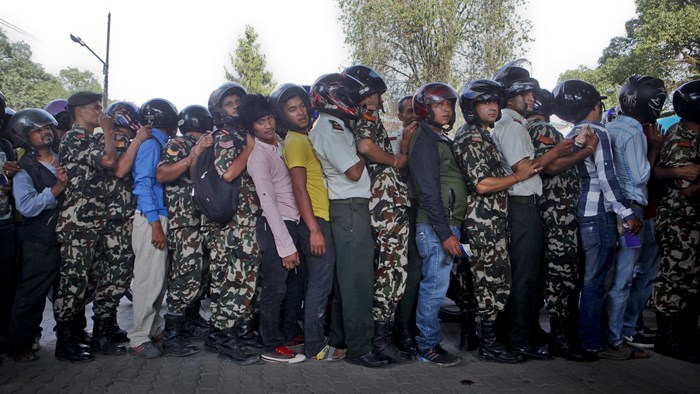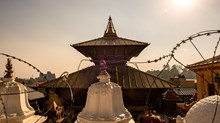
In the weeks since Nepal officially dashed the desire of many citizens to return to being a Hindu nation, attendance at its Christian churches has plummeted. Not for a lack of faith, but a lack of fuel.
After nearly a decade of debate, the former Hindu kingdom adopted a new constitution in September that declares the Himalayan nation to be a secular state. In response, India—Nepal’s top trading partner—cut off fuel from its neighbor, claiming that the new document hurts the political representation of minority groups.
The embargo has curtailed travel for many Nepalis, including its Christian minority. AsiaNews reports that some churches have seen attendance drop by 50 percent.
"Every year, hundreds of non-believers visit Nepal’s churches because they want to convert,” CB Gahatraj, general secretary of the National Christian Federation, told AsiaNews. “These people want to learn about the culture and life of the Christian community before their baptism. But in the current situation, they can be disappointed. We have just run out of fuel for our normal religious activities and missionary work."
The issue: India has sided with the Madhesi and Tharu, two ethnic minorities who claim the new geographic designations will leave them underrepresented by the new parliament. (The Indian Express offers an explainer.)
For more than a month, India has blocked fuel from crossing into Nepal, a disruption that has strained Nepal’s transportation and education systems. Madhesis living along the border have also physically blocked goods from entering the country.
Many Nepalis protested against India and its prime minister Narendra Modi, who was elected by a heavily pro-Hindu base. Last week, China agreed to begin importing fuel to Nepal as a means around the blockade.
Although some feared that Nepal's new constitution might lose its secular stance, more than two-thirds of lawmakers rejected turning the country back into a Hindu state. The new constitution upholds freedom of religion, but also states that “no one shall attempt to change or convert someone from one religion to another, or disturb/jeopardize the religion of others, and such acts/activities shall be punishable by law.”
This line could be used as “groundwork for future restrictions and discrimination,” said Elijah Brown, chief of staff at the 21st Century Wilberforce Initiative, a religious freedom advocacy group supported by former congressman Frank Wolf. (Wolf serves as a Distinguished Senior Fellow for the organization.)
In August, the group organized a letter asking Nepal’s government to reject a constitution draft that signatories believe “nullifies and criminalizes the freedom to share, change and choose one’s religion.”
Nepal’s constitutional process has been contentious. About 40 people, mostly protesters, died leading up to its passage. This week, police began clearing protesters from the camps where they have lived for the past month. About 500 protesters clashed with authorities.
Nepal received more than $4.4 billion in foreign aid after an earthquake 16 times more powerful than Haiti’s 2010 disaster killed more than 9,000 people in April. But it still struggles financially. While the government initially set 6 percent economic growth as a goal, the World Bank “reduced growth to 3.7 percent, due to various difficulties already present: the slowdown in growth, the drop in tourism, the growing protests among the population,” AsiaNews reports.
CT previously reported how dozens of Nepali Christians died when April's 7.8 magnitude earthquake occurred on a Saturday, the day weekly church services are observed. The Christian minority has long been enmeshed in an ongoing debate over burial rituals. Christians and Muslims favor burying their dead, while Hindus prefer cremation. Plans to establish official cemeteries for Christians, who have tripled in number since the Hindu monarchy was abolished in 2006, have not resolved tensions.

Support Our Work
Subscribe to CT for less than $4.25/month


















